Notes from the Capital: 2019 Kinder Scholars Updates
In early June, twenty rising Mizzou juniors and seniors lit out east to take part in the 2019 Kinder Scholars D.C. Summer Program, through which they’ll spend eight weeks living, working, and exploring in the capital. An almost complete list of internship sites can be found here, and we’ll be updating this post over the course of the summer with reports back from the front lines.
The students, of course, aren’t the only ones making the trek to D.C. Eight different faculty members will be joining them for a week to lead a session of the “Beltway History & Politics” seminar that all Kinder Scholars take and that tracks American political history from the first congressional election roughly through the Cold War. A complete list of seminar topics, as well as the field trips that faculty are pairing with their class sessions, can be found here.
Notes from the Capital, Installment 1 (Weeks 1-3)
Thanks to our first wave of responders, Aaron Carter (Political Science & Journalism), Karlee Adler (History), Sidney Steele (Convergence Journalism & Political Science), Madeline Clarke (History, Political Science, & Geography), and Christian Cmehil-Warn (Economics & Statistics), for sending word back to Columbia about the first few weeks of the Kinder Scholars Program.
KICD: At this point, you’ve only had a couple of weeks of class, but has there been an idea or subject that’s come up so far that you’ve been especially interested in and what you hope to revisit?
AC: The most interesting subject we’ve covered so far has been the philosophy of war and the different applications of it throughout our nation’s history, especially during the Obama administration. Obama put a lot of emphasis on the philosophies of just war theory, specifically Augustine’s and a few others’. The article that Dr. Perez assigned us, David Lubin’s “What would Augustine Do,” brought up the CIA’s questionable counting method for civilian casualties, which would seem to invalidate any moral philosophical argument that the military methods were “just.” Does just war theory yield leaders that take unconstitutional, illegal, or unwarranted actions? Would reliance on these philosophies contribute to more wars overall? These are just some of the questions I hope to answer in the next few weeks.
KA: Something we’ve talked about in a couple of classes is the idea that how we interpret history is more a reflection of us than of the period we’re studying. Even the questions we ask are influenced by the current culture in which we live. I love thinking about this idea as I walk through museum exhibits. Why this exhibit and why now? What does this exhibit present as important? I’ve always been fascinated by why we ask the questions we ask, and D.C. is a great place to explore this.
MC: I was particularly interested in the topic of the impact of the actions of foreign countries on the American Civil War, brought up in the seminar led by Dr. Sexton. I hope such ideas come up again in later classes, as I think that foreign impact on American history as a whole is often overlooked.
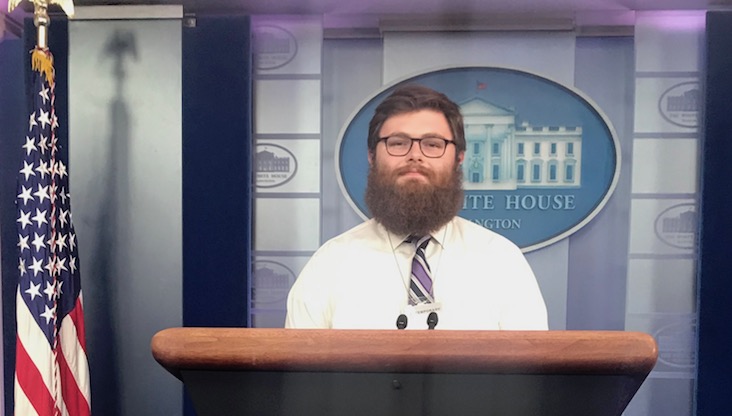
KICD: Similar “I know it hasn’t been long” caveat, but give us an internship update.
AC: I’m doing a dual internship this summer surrounding non-profit work on Middle East affairs and the relations between the U.S. and the region. The overarching organization I’m working for is called the National Council on U.S.-Arab Relations (NCUSAR), and through them I attend two weekly seminars, for which I’m assigned readings and essays, and go on various site visits around the city. My second internship, which I found via the NCUSAR, is at the Washington Report on Middle East Affairs, where I’ve had the pleasure of attending various think tank events and discussions about the region that have highlighted specific issues I’ve subsequently become interested in. For example, I know now that I hope to specialize in Israel-Palestine relations, as well as the political environment in Iraq.
KA: It’s been really interesting to learn about the internal function of the Smithsonian and how a museum runs from behind the scenes. I recently attended a meeting put on by the Smithsonian Women’s Committee for the various Smithsonian museums, and we went over how museums could submit grant proposals to the SWC and what types of proposals typically receive funds. I also attended a meeting about the fall Craft2Wear show and got to see how the event is organized.
SS: I’ve been interning at Street Sense Media, a newspaper about homelessness that also provides services to the homeless population in D.C. My expectations never could have prepared me for the experiences I’ve had so far. It has been very eye-opening to have conversations with the homeless population of D.C., and as a video storytelling intern, I’ve been able to develop my multimedia skills while doing work that serves a vulnerable population.
CCW: With the White House Transition Project, I’ve been helping Dr. Martha Kumar, the director of the project, organize, analyze, and visualize her data about modern administrations’ (from Reagan to Trump) relationships with the press and also about assistants to the presidents in those administrations. In both cases, she has the best records that exist, so it has been a pleasure working on them.
For my first few days in May, I had the privilege of working with her in the White House press area. She gave me a little tour, and I was able to meet several of the correspondents you see on TV and watch them in action. While this administration has all but killed the daily press briefing, I did catch the reporters questioning Kellyanne Conway. I’ll work there again when she gets back in July, and I’m incredibly excited to witness the government-press interaction right where it happens. (For the entire month of June, Dr. Kumar has been in Hawaii, so I’ve had the ability to set my own work times and locations. Dr. Kumar got me desk space in the White House Historical Association that I’ve been using, and I’ve also worked at various libraries, courtyards, and restaurants.)
MC: I have been interning at the Eleanor Roosevelt Papers, and it has been a fantastic experience. I am part of a group of seven interns, and so far, we have gone on a trip with our coordinator once a week. These trips have been to the Library of Congress to get researcher cards and learn to use the resources there; to the National Portrait Gallery for a private tour of the suffrage exhibit by the curator (who is also curator of the America’s Presidents exhibit); and a tour of Greenbelt, MD, a New Deal-era community. When in the office, I have had opportunities to work on independent research and learn to proofread documents for the next volume of the Papers. The best part about proofreading is getting to read Eleanor Roosevelt’s letters and connect her to President Harry Truman, who I will be writing my undergraduate thesis on next year. I look forward to soon starting a project with the director of the Papers, which will allow me to utilize skills I have learned as a geography student in a historical context, combining two of my majors.
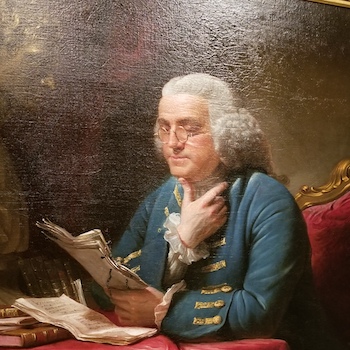
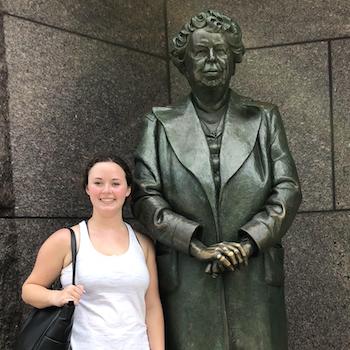
KICD: Columbia to District of Columbia is, to state the obvious, a huge change in culture. What’s been the best thing about being in the big city so far? Have you had a chance to do any exploring? Have you found “your D.C. spot” yet?
CCW: While I’ve definitely been exploring D.C. and have seen a lot of interesting stuff, I’ve really loved sampling the wide array of fast-casual Mediterranean restaurants. This might seem rather absurd, given the abundance of grandiose experiences in D.C., but places like Cava or Roti are perfectly filling and make me feel like I’m eating well and healthy (regardless of how true that actually is).
KA: The best thing about living in a big city is that there’s so much to explore. Even better, in D.C., there are so many museums to explore for free, and I’m trying to visit as many as possible. Because I work on the Mall, I often stop in a museum for a while after work, and I’ve already been to several, including the Portrait Gallery and African American History and Culture, twice.
SS: My favorite thing about being in D.C. so far has been the simple change in my way of life in the city, in comparison to Columbia. How I shop for food and get to work in the morning are completely unlike what I’m used to, in a way I quite enjoy. I love being able to walk everywhere and take in my surroundings, and I’ve had the goal not to go anywhere more than once when I could try something different, which has allowed me to try new food and learn new things.
MC: The best thing about being in D.C. is how close you are to everything: events, food, museums, and markers of our nation’s history. It is so easy to hop on the Metro and go anywhere you want or to just walk a few blocks and find neat restaurants, bookstores, etc. My favorite spot in D.C. so far is the National Mall, because I am forever wowed by the views of the Capitol and the Washington Monument. The other great thing about the Mall, of course, is the access to Smithsonian museums. What more could a history major ask for than museum after museum all next to each other and free to enter?
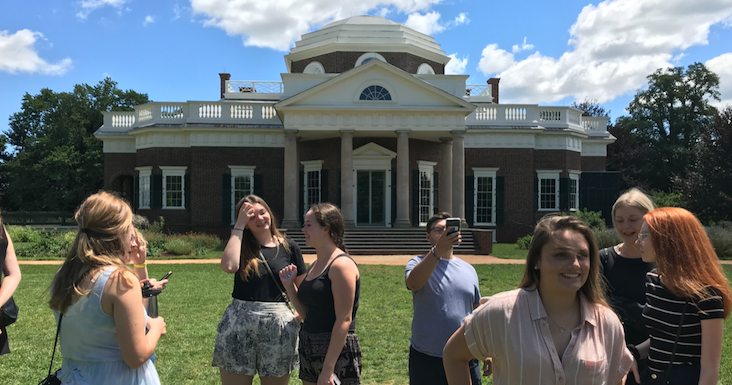
Notes from the Capital, Installment 2 (Weeks 4-6)
For the second, post-July 4th in D.C. installment of our “Notes from the Capital” update series, Kinder Scholars Riley Messer (Political Science), Siobhan Conners (Journalism), and Laura Murgatroyd (Journalism & Political Science) weighed in on favorite readings from the “Beltway History & Politics” seminar, out-of-town field trips, and their post-internship futures.
Kinder Institute: Now that you’ve had a bit more time in the “Beltway History & Politics” seminar, I was wondering if you might talk about your favorite reading so far, namely why you were so drawn to it and how, perhaps, it connected to other readings.
Riley Messer: My favorite reading so far offered a unique perspective into the academic world. In his lesson about elections in the early American republic, Dr. Dow provided the class with a draft chapter from his book-in-progress, and seeing a publication in its earlier phases was incredibly interesting. The subject matter of the piece also stood out to me due to its exploration of concepts such as party formation, electioneering, and political ideology. As a political scientist, I enjoyed gaining more insight into the history underlying these concepts in order to draw parallels to discussions that continue to this day about political parties or representation in our government. The intersection of history and political science within the reading also represents what Kinder Institute programming is all about—the interdisciplinary study of subjects related to constitutional democracy in which experts from all different fields can contribute.
Siobhan Conners: As a Journalism major, I haven’t had the opportunity to take as many history and/or political science classes as I would like to, so the “Beltway” class and its readings always shed light on topics I’ve wanted to know more about. For that reason, I found Dr. Dow’s class (and reading) about early American elections really fascinating. I had always thought that political parties weren’t prominent during elections until the Jacksonian era, but the reading disproved that and gave new context to elections during the early 19th century. In general, I had understood that period of American history in a pretty choppy way, but the reading filled in some grey areas, and I ultimately walked away feeling much more educated on the subject.
Laura Murgatroyd: My favorite readings so far this summer were Week 6’s. Rather than provide information about Washington himself, Balancing Inspiration and Education at George Washington’s Mount Vernon Estate and Gardens (UC-Berkeley Press) and Historical Memory, Sectional Strife, and the American Mecca (from The Virginia Magazine) offered a look into the history of the estate and how it came to be the profit-making tourist attraction it is today. This generated a lot of detailed in-class and internal discussion about whether Washington himself would even want his home on display to the public (he opted out of a public funeral after all). Another interesting discussion that the readings sparked concerned the difference between education and inspiration—specifically, the idea that Washington’s home could be used as an educational resource on the history of enslaved people while simultaneously being a form of inspiration to its visitors on presidential and American history. Ultimately, I think these readings offered a more modern take on the history the estate holds, the development of tourism at the house, and the preservation of it, which, as a journalism major who often deals more with information “in-the-now,” provided some slight release from more in-depth historical texts.
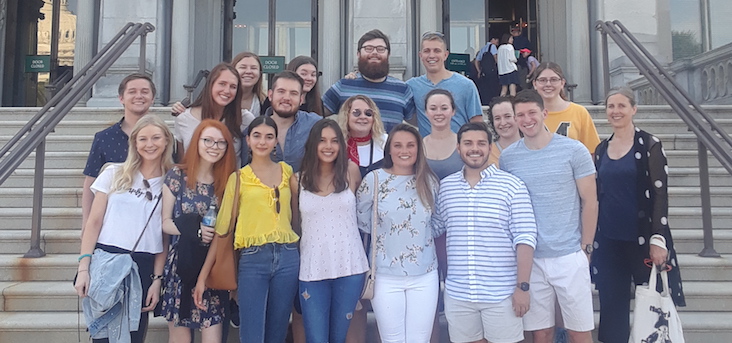
KICD: I’m always super curious about the field trip component of the D.C. program and the value that it adds. Can you give some context for how this experiential aspect enhances the readings and discussions in the classroom?
RM: The field trip to Jefferson’s Monticello paired perfectly with the readings and discussion that accompanied it. The point to both the field trip and class session was to deconstruct the character of Thomas Jefferson—a very complicated character indeed—and contextualize his life as a prominent American statesman and thinker. Through reading very different works by Jefferson, such as selections from his Notes on the State of Virginia and his “Head-and-Heart” letter to Maria Cosway, we explored his multifaceted personality and assessed the popular historical narrative surrounding his life. Being able to tie a physical location (Jefferson’s estate at Monticello) to these abstract concepts made the lessons about this founding-era thinker even more fascinating. We were able to tour the location where Jefferson read and wrote while he was alive. We witnessed the miserable conditions in which Jefferson kept his slaves. We even saw where Jefferson met his eventual death. Not only was the experience an intellectual challenge, but it was unforgettable due to the perspective it provided.
SC: As a lifelong Midwesterner, I was excited for the field trip component of this program for the sheer fact that it would give me the opportunity to explore more of the East Coast. Doing that exploring has been really cool in and of itself, but it’s also helped me contextualize our readings and discussions in a unique way—especially when the founding fathers are involved. The place that really came to life for me was Mount Vernon. It was one thing to read about the plantation and study what it meant to Washington, but seeing it in person made everything seem so much more real. I had no idea, for example, that Washington dedicated so many rooms in his home to overnight guests. With hundreds of Americans still pouring into his home every day, it just seemed like everything had come full circle. Honestly, it made me feel like I was a part of history!
LM: I am constantly in awe of the many wonders that lie a short drive from the federal city boundaries, and Annapolis did not disappoint! The field trip to Annapolis started off with a walking tour of the city and State House, and it focused a lot on powerful women in history. Being able to talk about the history of the places around the area while standing in the spots where it all happened and relating it all back to influencers of the time period allowed for my appreciation of and respect for history to go that much deeper. A great thing about the Kinder Scholars Program is that we get the best of both worlds: we get to see it and read about it. During week 4, for example, Dr. Rymph’s trip to the Sewall Belmont House to learn about women’s suffrage had to be reorganized due to some unforeseen circumstances. This meant that we had to find an alternative trip the day of, and Dr. Rymph ended up taking us to the Library of Congress to see the women’s suffrage exhibit there. While the readings set for that week were not necessarily intended to be paired with the exhibit we saw, they nonetheless were very fitting.
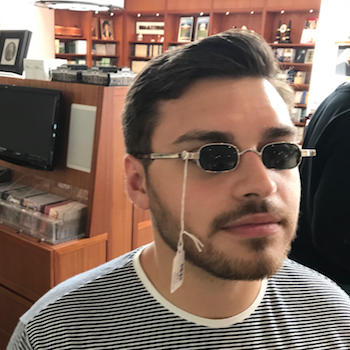
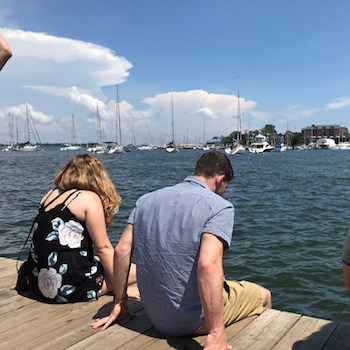
KICD: And finally, a brief internship update: (A) What’s been the highlight so far and why; (B) Has the work you’ve done this summer given you any clarity about what you want to do post-Mizzou; or (C) Both.
RM: As a research and investigations intern at American Oversight, an anti-corruption nonprofit that utilizes Freedom of Information Act (FOIA) requests and litigation to produce information about government activities for the American public, I have been awarded a number of unique opportunities to explore the legal and political process of the United States. I am lucky enough to be constantly partnered with the attorneys on staff as I draft FOIA requests and complete investigation assignments, so I have spent a significant amount of time discussing my plans post-Mizzou with individuals who have attended law school and worked in the field of law. After many conversations about the subject, I’m much more certain about my plans after graduation. I have always wanted to go to law school and practice law, and after meeting and spending significant time with attorneys, I truly believe that my choice to go to law school will be the right one. In fact, I could see myself in a career after law school in which I practice public interest law for a nonprofit organization similar to the one I’m at now.
SC: My internship has made me seriously question what I want to do after graduation, which I think is a really good thing! Before this summer, I was hoping to work for a magazine or some sort of regional media publication after graduation. However, my internship has made me realize that I have passions outside journalism. I’m working at the Federal Communications Commission in its Legislative Affairs Office, which means I spend a lot of time following hearings and researching legislation, and it’s shown me how much actually goes on in government and how passionate those who work in it are. One of the highlights of my experience was meeting Ajit Pai, the Chairman of the FCC. It was the first time I saw someone who works in politics outside of a TV screen, and it was humbling to get a sense of how much work goes into the position. The word bureaucracy usually has a pretty negative connotation attached to it, but my internship has helped me see that people in bureaucracy can enact real, positive change. It clicked for me that I could be one of those people too, so I’m now considering going to law school after graduation with the ultimate goal of working with public policy one day!
LM: Through my internship as a reporter at Sightline Media Group, I have been lucky enough to visit fellow reporters at the Capitol and the Pentagon, and with that comes time to network and discuss the best ways to make it in Washington and in the media. The highlight of my internship so far was getting to be an assistant photographer at the Service Member of the Year awards, where I met Kyra Phillips, an investigative correspondent for ABC News (with my journalism emphasis being investigative, we had a lot to chat about). You can find networking opportunities in D.C. around every corner and in the places you least expect, which I love—people sharing their stories of why they love D.C. and love their jobs really reaffirms why I hope to be in their shoes post-Mizzou.
